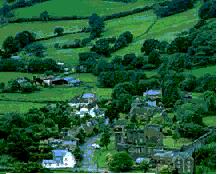Welsh language
Welsh is sometimes called "the most strange Indo-European language". None
of the languages of this family looks, reads and pronounces so strangely
as Welsh does. If you see Welsh texts for the first time or first hear
Wesh speech you will be sure it has nothing to do with English. But it
also an Indo-European tongue, just a very interesting one.
 Welsh,
called Cymraeg or Cymric (from Cymru, "Wales")
by its speakers, is the native language of Wales and the most flourishing
of the Celtic languages. It is spoken in Wales (where the majority of its
users also speak English) and in some communities in the United States
and Argentina. Organizations such as the Society for the Welsh Language
have saved the language from dying out and are working to assure its official
status along with English. Several schools in Wales now use Welsh as the
medium of instruction, and television and radio broadcasts are made in
the language. On the Web you can find a lot of resources on it, too.
Welsh,
called Cymraeg or Cymric (from Cymru, "Wales")
by its speakers, is the native language of Wales and the most flourishing
of the Celtic languages. It is spoken in Wales (where the majority of its
users also speak English) and in some communities in the United States
and Argentina. Organizations such as the Society for the Welsh Language
have saved the language from dying out and are working to assure its official
status along with English. Several schools in Wales now use Welsh as the
medium of instruction, and television and radio broadcasts are made in
the language. On the Web you can find a lot of resources on it, too.
Like Breton, Welsh has discarded case endings for nouns; verbs, however,
are elaborately inflected. The alternation of consonants, called mutation,
plays a role, as in all Celtic languages. Welsh spelling is phonemic, representing
unambiguously the pertinent sounds. In most cases Welsh speakers will know
how to pronounce a word they have never seen before. The letter w
can represent either a consonant or a vowel, however, and y stands
for two vowel sounds. The consonant f has the sound of English
[v]; ff of [f]. Popular attempts to describe pronunciation
of double l (ll) all fail - there is no such
sound in the International Phonetic Alphabet. It is a voiceless lateral
fricative, and facile comparison to English thl is invalid.
Welsh words are accented on the next to last syllable and have a characteristic
intonation.
Scholars recognize three periods of Welsh: Old (800-1100), Middle (1100-1500),
and Modern (from 1500). Old Welsh survives only in isolated words and names,
plus a few lines of verse. Welsh has borrowed words throughout all these
periods from Latin, Anglo-Saxon, Norman French, and extensively from English,
but it still has a large native vocabulary of Celtic origin. Forty dialects
have been identified in Wales. Standard Welsh has both a Northern and Southern
variety.
Welsh Links
 Welsh,
called Cymraeg or Cymric (from Cymru, "Wales")
by its speakers, is the native language of Wales and the most flourishing
of the Celtic languages. It is spoken in Wales (where the majority of its
users also speak English) and in some communities in the United States
and Argentina. Organizations such as the Society for the Welsh Language
have saved the language from dying out and are working to assure its official
status along with English. Several schools in Wales now use Welsh as the
medium of instruction, and television and radio broadcasts are made in
the language. On the Web you can find a lot of resources on it, too.
Welsh,
called Cymraeg or Cymric (from Cymru, "Wales")
by its speakers, is the native language of Wales and the most flourishing
of the Celtic languages. It is spoken in Wales (where the majority of its
users also speak English) and in some communities in the United States
and Argentina. Organizations such as the Society for the Welsh Language
have saved the language from dying out and are working to assure its official
status along with English. Several schools in Wales now use Welsh as the
medium of instruction, and television and radio broadcasts are made in
the language. On the Web you can find a lot of resources on it, too.